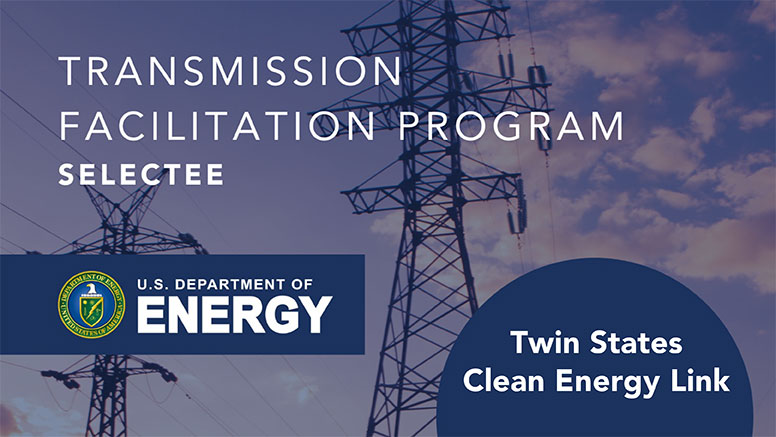
Twin States Clean Energy Link has been selected to receive financial support from the federal government. (Courtesy)
A proposed 211-mile transmission project bringing Canadian hydropower through Vermont and New Hampshire has been selected as one of three projects nationwide to receive support from the U.S. Bipartisan Infrastructure Law’s Transmission Facilitation Program.
Twin States Clean Energy Link had been awaiting word on potential federal investment until this week, when the U.S. Department of Energy announced it will commit to purchasing a percentage of the total proposed capacity of the eligible transmission line.
The 1,200 megawatt project, a partnership between National Grid, Citizens Energy Corporation, and Northeastern Vermont Development Association, still remains subject to all local permitting and contractual arrangements.
“This is an important step forward for Twin States as we work to make the project a reality for the region,” said Stephen Woerner, New England president at National Grid. “DOE has recognized the significant economic and environmental benefits of this project to New England communities, residents and businesses and we’re grateful for this recognition from our federal partners.”
According to National Grid, Twin States would deliver clean energy from Canada to New England to support the region’s decarbonization goals and increase the supply of affordable clean energy. The line would be bi-directional, meaning it would enable clean energy producers in the region, such as offshore wind, to export excess capacity to Quebec during lower domestic demand.
National Grid expects the project will lower costs for customers across New England, creating more than $8.3 billion in wholesale energy market cost savings over the first 12 years of operation alone, according to an independent market assessment.
The project has received initial support from elected officials and other stakeholders because it would utilize existing transmission corridors in Vermont and Maine, while burying new lines along state roadways. According to the DOE, if all necessary permits are achieved, construction is expected to start in 2026.
Gov. Chris Sununu, who has supported the project since its announcement in May, celebrated the federal government’s announcement.
“Ratepayers come first in New Hampshire,” he said. “Tapping into hydropower resources, the Twin States Clean Energy Link project makes use of clean, renewable energy to deliver the region a reliable energy source with cost savings for consumers. This project is a win for New Hampshire.”
As part of the project, National Grid and Citizens Energy Corporation are also assembling a $260 million community benefits program, at least 40 percent of which will be dedicated to disadvantaged communities throughout New England.
This story is courtesy of NH Bulletin under creative commons license. No changes have been made to the article.

 Current Issue - April 2024
Current Issue - April 2024